Pakistan’s real estate sector is entering a new era of accountability and modernization. For decades, buyers have struggled with property fraud, unauthorized housing societies, and financial mismanagement. However, the government’s introduction of escrow accounts and QR-code verification systems for housing schemes in Pakistan is setting a new benchmark for transparency and trust. These digital and financial reforms are now reshaping how both developers and homebuyers interact within the real estate Pakistan landscape.
Understanding Escrow Accounts in the Real Estate Context
In simple terms, an escrow account acts as a neutral third-party fund holding mechanism. When a buyer invests in a housing scheme Pakistan, their payment is deposited into an escrow account managed by a regulated financial institution. The funds are released to the developer only when pre-defined construction milestones are met. This ensures that developers cannot misuse advance payments or divert money to unauthorized projects.
Recently, the Capital Development Authority (CDA) and Rawalpindi Development Authority (RDA) have directed all registered societies to maintain escrow account regulations for housing schemes in Pakistan, enabling fund transparency housing project management. This initiative builds public trust in the real estate sector, ensuring that investors’ capital remains secure throughout the construction process.
Such secure payment mechanisms property arrangements minimize the risk of plot file fraud Pakistan 2025, a persistent issue in unregulated developments. For genuine projects, these accounts serve as proof of compliance, helping both developers and buyers operate under a transparent financial framework.
QR-Code Verification: A Step Toward Digital Trust
Parallel to financial safeguards, QR-code verification systems for housing societies Pakistan are revolutionizing how property ownership and authenticity are validated. Each plot allotment letter QR code links directly to a government-verified database, enabling instant access to the project’s status, approvals, and legal details. This digital verification platform housing initiative ensures that investors can verify a property’s legitimacy with a single smartphone scan.
Through this innovation, the public can now verify housing society NOC approval online, mitigating the risk of falling victim to unauthorized housing society fraud. The move aligns with the national push toward e-governance and digital transformation, promoting confidence in legitimate developers while discouraging deceptive marketing practices.
The Synergy Between Financial and Digital Reforms
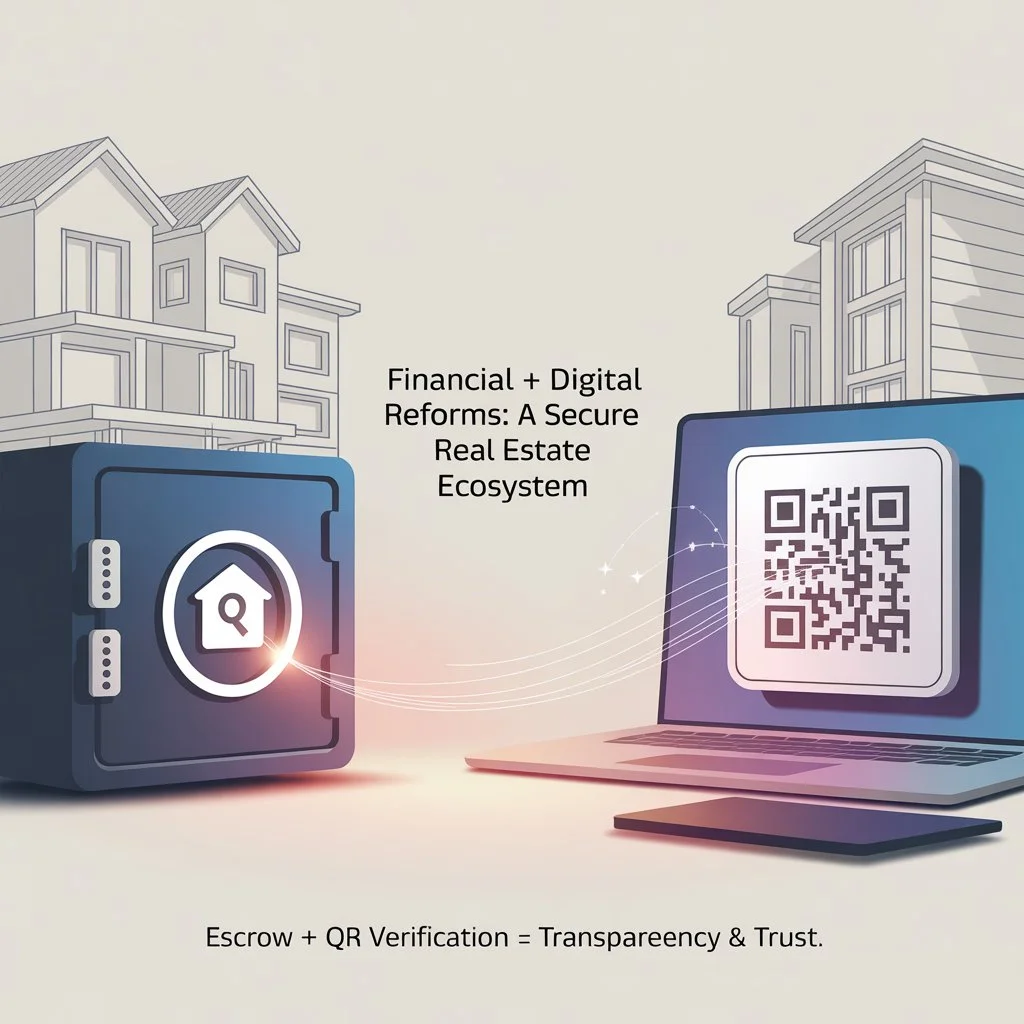
The combined power of escrow and QR systems creates a two-layered defense against real estate malpractice. On one hand, escrow ensures neutral fund control, while QR verification provides instant transparency. Together, they make it nearly impossible for developers to advertise or sell unapproved projects.
For investors, these reforms mean they can check housing society approval process Pakistan in real time before transferring any funds. Developers, meanwhile, benefit from increased credibility, as these systems attract buyers seeking safe, verified investment opportunities. This synergy contributes to a transparent housing project ecosystem, aligning with Pakistan’s broader vision for urban modernization.
Why Housing Schemes in Pakistan Need Escrow Accounts and QR Codes
The past few years have seen a rapid expansion of residential and mixed-use developments across major cities. Unfortunately, many unregistered societies emerged, leaving thousands of buyers uncertain about their investments. The government’s decision to integrate escrow accounts and QR verification in Pakistan real estate is a direct response to this trust deficit.
These tools act as compliance enforcers. An approved housing scheme must prove that its layout is master plan-approved, maintain fund isolation, and provide digital traceability through QR codes. As a result, development authority approval becomes a prerequisite for both financial transactions and public marketing.
For consumers, this also simplifies due diligence. Instead of visiting multiple offices, one can scan a QR code and instantly view the project’s NOC status, layout plan, and ownership details. This step-by-step verifying housing society via QR code Pakistan approach empowers individuals and ensures housing society transparency on an unprecedented scale.
Developer Perspective: Building Credibility Through Compliance
While some developers initially viewed these regulations as restrictive, many now recognize their long-term benefits. Housing developers adhering to escrow account regulations for housing schemes in Pakistan and implementing QR-based systems are witnessing improved buyer confidence and faster sales cycles. This compliance demonstrates commitment to fund transparency, reducing the gap between promise and delivery.
For credible builders, these systems serve as marketing assets. They can highlight how escrow accounts work in housing schemes Pakistan and promote their verified status through official QR links. This transparency not only attracts investors but also differentiates them from competitors still struggling with compliance issues.
Preventing Real Estate Fraud with QR Codes in Pakistan
Fraud prevention remains a major objective behind these technological interventions. In the past, property fraud Pakistan often stemmed from duplicated documents and fake approvals. With QR-based plot verification, fake allotment letters or counterfeit receipts can be identified instantly. Every scan links back to the official registry, eliminating manual manipulation.
Authorities are also using this system to track illegal housing societies Pakistan how to avoid, shutting down unregistered projects before they cause widespread loss. By integrating this digital trail with escrow data, the government can prevent any funds from reaching non-compliant developers, marking a major leap forward in Pakistan’s online real estate verification operations.
Benefits of Escrow Accounts and QR Verification in Pakistan Real Estate
The advantages of these dual mechanisms are multifold:
- Investor Safety: Buyers’ funds remain protected until verified milestones are achieved.
- Developer Accountability: Only compliant projects can access disbursements.
- Public Trust: Instant plot verification through QR codes eliminates confusion.
- Regulatory Oversight: Real-time monitoring ensures unauthorized housing society fraud is curtailed.
- Market Credibility: Developers gain an edge by showcasing verified credentials.
This reform also helps international investors explore Pakistani real estate with renewed confidence, encouraging foreign direct investment (FDI) in the housing sector.
The Future of Digital Housing in Pakistan
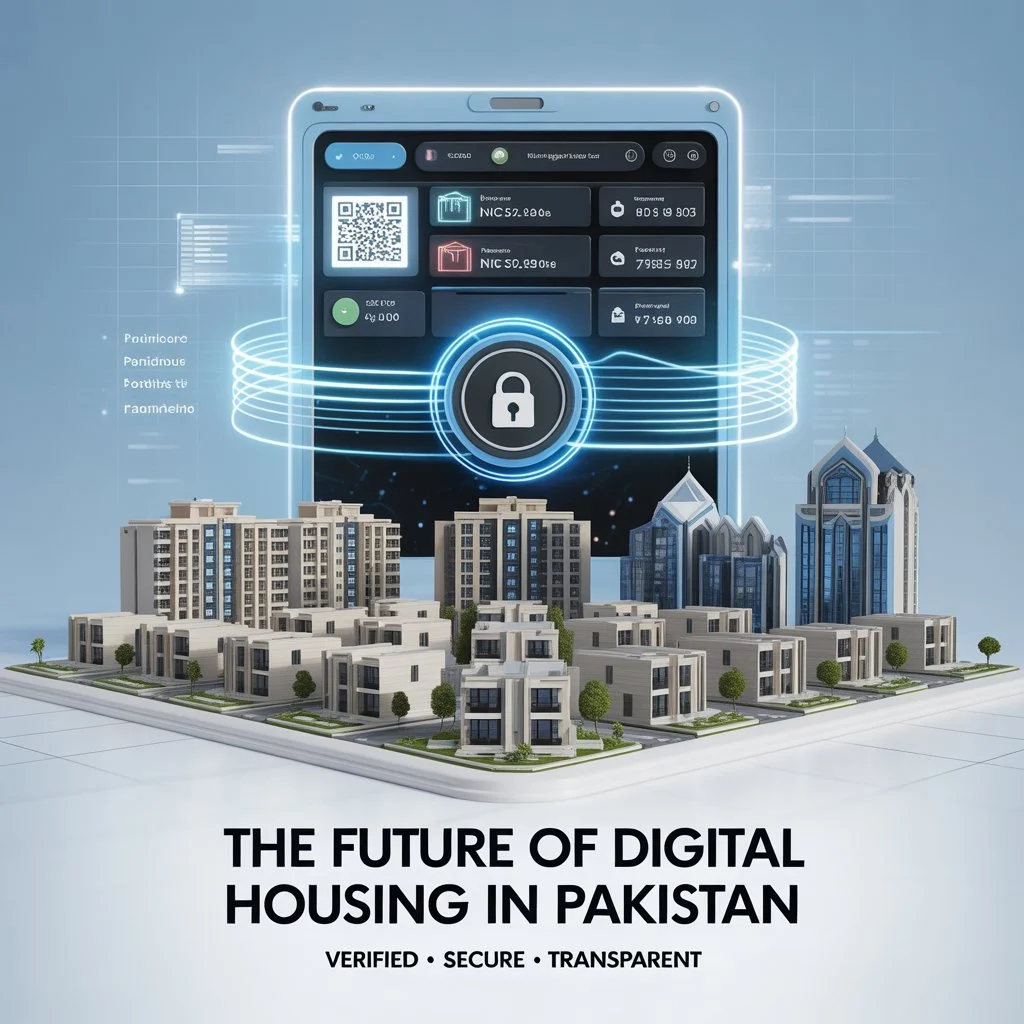
Looking ahead, the integration of escrow and QR systems is likely to expand beyond housing to cover mixed-use developments, commercial plazas, and industrial zones. Regulatory bodies are also planning centralized dashboards where citizens can access all project data, payment history, and NOC details in one secure location.
As these technologies mature, they will significantly reduce housing scheme scams in Pakistan, paving the way for a professional, transparent, and investor-friendly property market. This evolution marks the start of a digital revolution that will redefine how Pakistan’s housing sector functions one verified QR code and one safeguarded escrow account at a time.
Conclusion
The combination of escrow accounts and QR-code verification represents more than just technological progress it signifies a shift toward ethical real estate development. Through these systems, Pakistan’s property market is building a future where every rupee is traceable, every project is verifiable, and every buyer can invest with peace of mind. In essence, the nation is laying the foundation for sustainable urban growth grounded in transparency, security, and digital empowerment.
Want to know more? Check out Government Crackdown on Housing Society Scams: How to Avoid Cheap Plot Fraud in Pakistan
Like, share and comment: Facebook, Instagram, Youtube and TikTok.

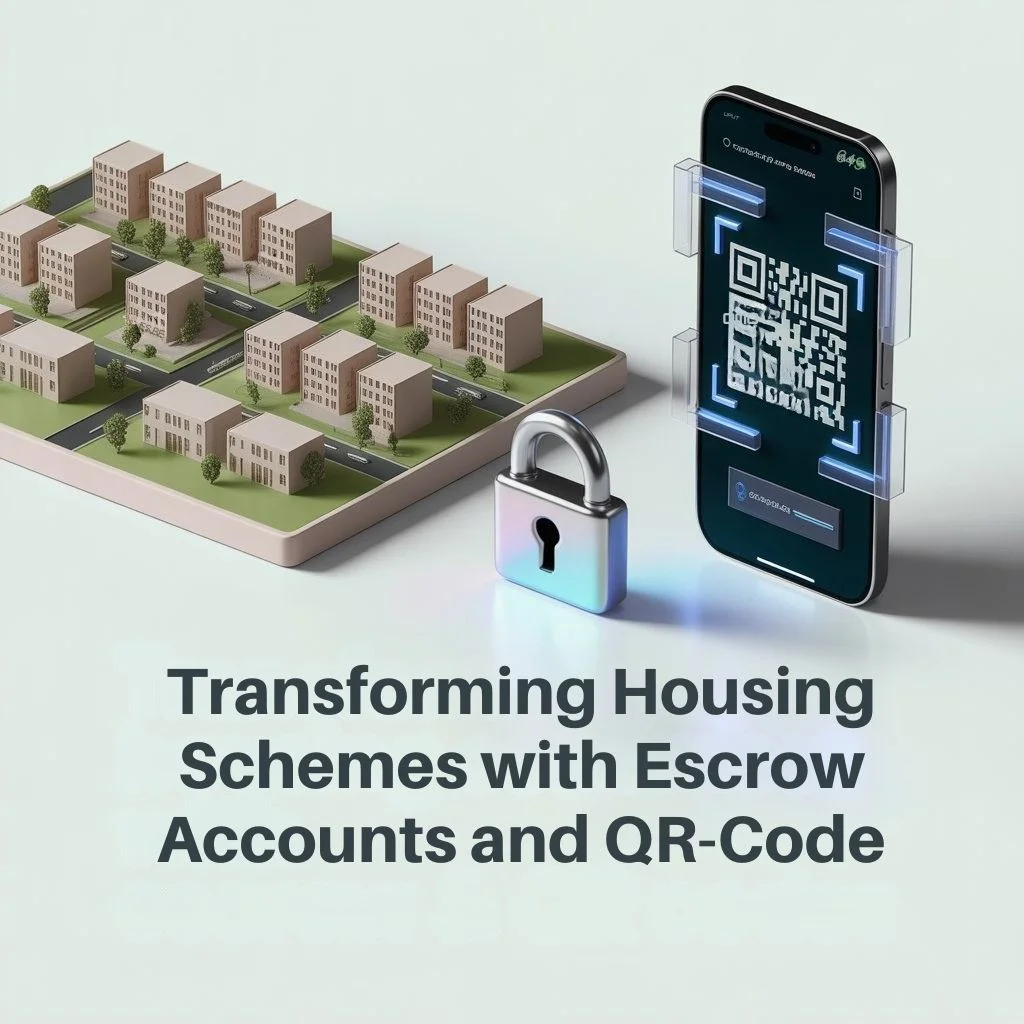
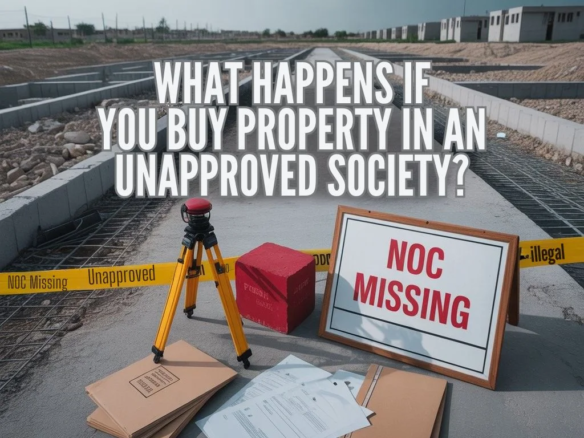
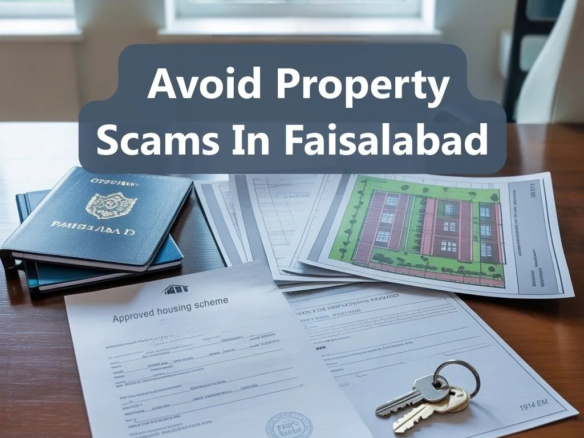

Join The Discussion